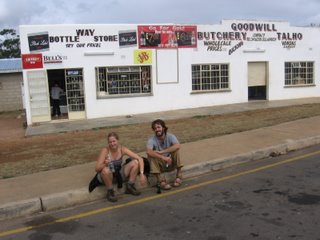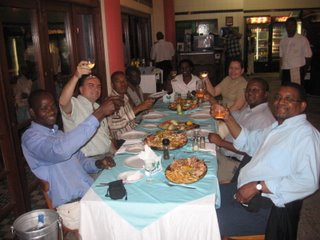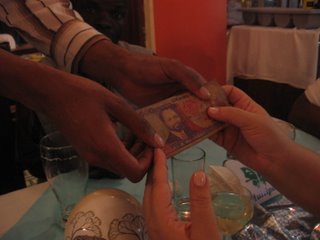The Joy of Visitors 
Last week I had the pleasure of having my good friend Reynold come and visit me here in Maputo along with his girlfriend Anne. This was exciting because they were the first friends from home to come and be a part of my life here in Mozambique. Visitors are always such a blessing and we had such a good time getting caught up on the past year of our lives, exploring new frontiers and reminiscing about the “good ol days.” It was also a real pleasure to finally meet Anne as she far exceeded all of the glowing reports that had made it over to me here from Winnipeg. Anne is currently working as a hospital chaplain and has a refreshing outlook on the Mennonite faith and contemporary spirituality. Her and Reyn really seem to complement each other, which is essential in any good relationship. You certainly get my two thumbs up Anne, welcome to the family!! (ha ha)
Like most tourists that come to Mozambique, my friends had a definite hunger for some fresh seafood and lounging by the beach. I was able to satisfy their appetite with some grilled prawns and fried lulas (calamari in Portuguese). Always the adventurous types, I think Anne and Reyn must have walked every street in Maputo twice during their excursions around the city, marveling over the fresh coconuts, massive pineapples and peri-peri cashews.

On the first weekend they were here we set off for Chidengale Beach, a seaside paradise that I had been told of 400 km north of Maputo. We set off on the Saturday morning on cramped local bus, enduring the four hour journey to the sleepy beach community. We had every intention of camping on the beach to save some money and enjoy the outdoors to the fullest. I even borrowed a tent from my friend John so we would not all have to cram like sardines into my two person tent.
The bus was so full however that we could not all sit together and we had to pile all of our luggage into a giant pile by the main entrance. When we arrived at our stop at Chidengele I had to get out of the driver’s door as it was impossible to leave by the regular entrance. I had to walk around the bus to pick up John’s tent from the chaotic pile in the middle but before I was able to retrieve the tent the bus abruptly pulled away leaving me cursing and running frantically down the highway waving my arms in pursuit. My efforts were all in vain. The tent was gone.
The only thing that could have raised my spirits at that point was the beautiful 5 km walk through the wilderness on route to the beach. We passed old run down colonial buildings, reed huts and a massive fresh water lake where the naked locals were bathing and washing their clothes in the hot sun. The beach was spectacular as well and we spent the rest of our daylight hours chucking the Frisbee around and body surfing the massive waves. At night we were treated to a magnificent display of stars, contrasted against the rhythmic calling of the surf. This was the Mozambique that Reyn and Anne came searching for and they certainly found it that weekend.

We parted company the next day, myself returning to Maputo while my friends continuing north to the beaches in Inhambane. They returned the next weekend, bronzed by the sun and full of stories from their week at Tofo and Barra. We decided to check out Swaziland for a couple of days and took off once again on public transit for Mbanane. When ever one travels by chappa (bus/van) in Africa, they have to leave all notions of personal space behind and take along an extra dose of patience. Of course a long wait at the border is always easier when you can have a cold beer to pass the time. Here’s a shot of Anne and I enjoying some of the finer points of border stopping.

We packed our time in Swaziland with great meals, visits to “cuddle puddles,” exploring cultural villages, climbing around waterfalls and late night poker tournaments with our friends at the hostel. We learned a bit about the history of Executioner’s Rock, the highest point in the Swazi Royal Valley where criminals were ordered to jump off if they were found guilty of witchcraft or murder. The mountain commands a dramatic presence, especially in the late afternoon sun.
I had such a great time with Reyn and Anne during those two weeks and I wish them all the best back in Winnipeg this fall. Their visit made me even more excited for the visits in October from my parents and from my friend Doug Rhoads, whom I have not seen since we lived together in the West Bank seven years ago. Anyone else interested in coming to Mozambique? My place is always open to those that make it here!!













